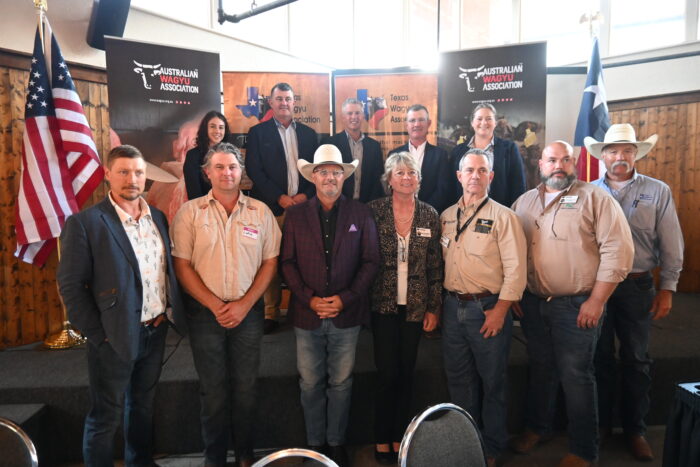International Office officially open in Fort Worth, Texas.

AWA Staff and Board Members alongside board members from the Texas Wagyu Association, at the international offices official opening on May 17.
The Australian Wagyu Association (AWA) has become a leader in the International Wagyu Industry and has a rapidly expanding global membership. It is with great advancement to all our members that the AWA announces the opening of its International Member Service Office in Texas USA. The Texas office was officially opened in front of 180 International members, on 17 May 2024 to deliver improved services to our members in the UK, EU, USA and Canada. The Office will deliver:
- Equivalent service standards for all AWA members
- Increased access for all members to global Wagyu genetic diversity
- Improved management of the limited global Wagyu gene pool
- Opportunities to better understand and manage inbreeding depression
- Enhanced benchmarking of diverse genetics to the global reference population
- Increased business efficiency for AWA Australian and international members
AWA International Membership:
International Wagyu breeder membership has been part of the AWA since the Takeda Farm membership was created in 1996. There has been a global trade of Wagyu genetics into and out of Australia since then and a continual increase in AWA international full membership as Wagyu breeders around the world have shared genetics with Australia and visa-versa. In May 2023, the AWA Board approved establishment of an international office to improve service provision and engagement with 450 international Wagyu breeders from 30 different countries who are AWA members.
Improved business efficiency:
AWA has previously managed support of all Australian and International members through its Australian office business hours. Services to international members will be significantly improved through operation of AWA’s international office within the USA, which will allow us to better assist USA, UK and EU members. International members will benefit from increased turnaround time in addressing service requests within USA office hours. Australian members will benefit from increased turnaround time with Australian based staff primarily addressing Australian member requests within Australian office hours.
The Global Wagyu Gene Pool:
Understanding the need for global access to Wagyu genetic diversity, the Australian Wagyu Association brought together representatives of international Wagyu Associations in 2015 to form the World Wagyu Congress. This enabled streamlining of DNA parentage and registration systems for most global Wagyu registries under common processes, information sharing and reciprocal recognition between Associations. The AWA maintains formal service partnership arrangements with many international Wagyu Associations.
The AWA Herdbook now contains more than 300,000 registered Wagyu cattle from our members in more than 30 countries. Increasing the contribution of international animals to the AWA Herdbook will expand AWA pedigrees further and secure the AWA’s position as the most diverse, comprehensive and accurate Wagyu registry globally.
Managing Inbreeding Depression:
Inbreeding depression is the reduced phenotypic performance in animals within a population over time resulting from increased inbreeding. It is the opposite of heterosis, which is observed in crossbreeding of cattle. Negative effects of inbreeding depression can be observed at levels higher than 5%. Based on pedigree relatedness across all Wagyu animals within the AWA database, the average pedigree inbreeding coefficient is 6.6%. However, this calculation is based on shortened pedigrees that fail to recognise ancestral inbreeding of Wagyu cattle in Japan prior to exportation of the global Wagyu herd. Actual inbreeding calculated using genomic relatedness within the AWA database estimates true average inbreeding closer to 10%, indicating that strategies to enable improved management of inbreeding and increased genetic diversity are of immediate importance. A globally accessible database of all available genetic diversity is a necessary tool for enabling future security of the Wagyu gene pool.
Optimising Genetic Diversity:
The global Wagyu gene pool is a narrow and shared resource across all counties able to export and import Wagyu genetics following the original exports from Japan. Through increased inclusion of internationally bred Wagyu cattle, we are better able to examine the genomic differences between every single animal in the population. We will shortly be providing new tools (genetic diversity and inbreeding measures) to assist all Australian and International members to identify genetic diversity with the global Wagyu population and use this within their breeding programs.
Expanding the benchmarked Gene Pool:
Increased international member animal registration and genomic testing has improved the ability for International AWA members to contribute their genetics into benchmarking programs. This includes benchmarking their performance within Australian herds through collaborations and through the AWA-PTP. Increasing participation and active exchange of genetics between international members and the Australian Wagyu population through the AWA-PTP will enable access to outcrossed genetics that have quantified performance estimates in the globally accepted Australian trait scales.
Maintaining the AWA genetic analysis as the accepted global standard:
AWA International membership growth and use of AWA published EBVs and selection indexes has created a common language for breeders around the world to work together and share genetics. The AWA’s genetic analysis is the globally accepted and by far the most comprehensive and accurate analysis for Wagyu cattle. Expanding the international engagement with the AWA’s registry and genetic improvement tools will aid stable future genetic progress for all members through continued use of AWA’s tools as the global benchmark for Wagyu.
